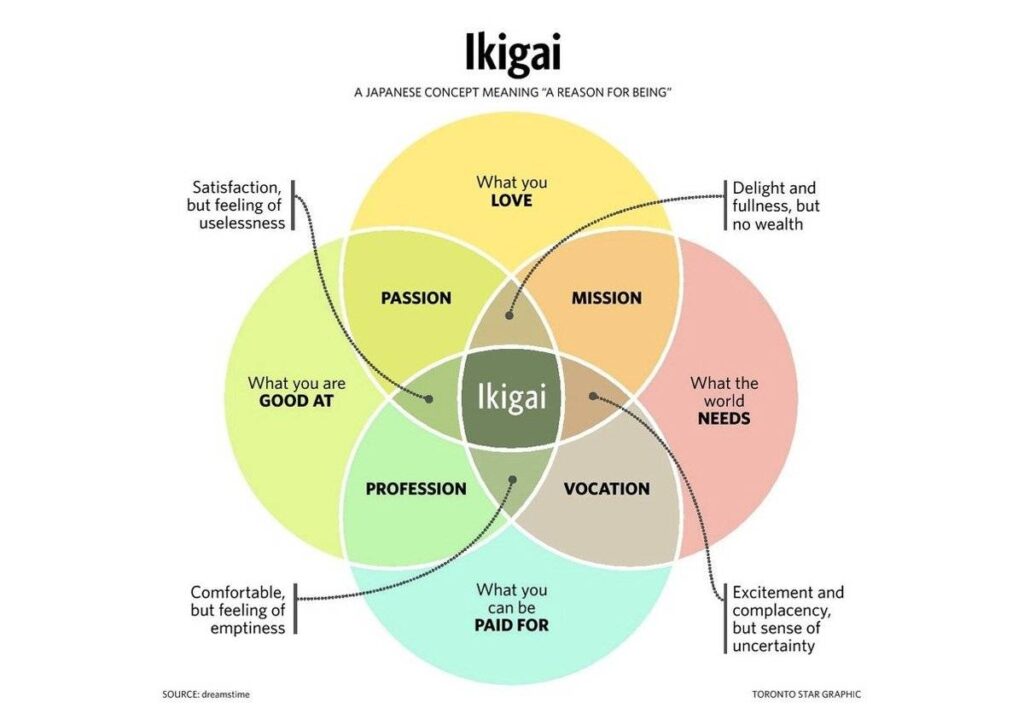In the fast-paced world we live in, finding a deeper sense of purpose and fulfillment can be challenging. The Japanese concept of Ikigai offers a unique perspective on this quest for meaning, blending philosophy and practicality. This article explores Ikigai’s origins, its four fundamental elements, how it can be applied to modern life, and the impact it has on well-being.
The Origins of Ikigai
Historical Context
The term Ikigai comes from the Japanese words “iki“ (life) and “gai“ (value or worth). It is deeply rooted in Japanese culture and philosophy, reflecting the traditional values of purpose and meaning that have guided Japanese society for centuries. The concept has historical ties to Zen Buddhism and Confucianism, both of which emphasize the importance of finding balance and purpose in life.
Cultural Significance
In Japan, Ikigai is more than just a concept; it is a way of life. It influences how people approach their work, relationships, and daily activities. The Japanese believe that finding one’s Ikigai can lead to a more satisfying and fulfilling life, helping individuals navigate the complexities of modern existence with a sense of purpose and direction.
The Four Elements of Ikigai
What You Love
The first element of Ikigai is “what you love.“ This refers to the passions and interests that bring joy and fulfillment. Identifying what you love is crucial for discovering your Ikigai, as it forms the foundation upon which the other elements are built.
Self-Reflection: Take time to reflect on activities and hobbies that make you lose track of time. These are often clues to what you genuinely love.
Journaling: Keep a journal to document moments when you feel most alive and engaged.
What You Are Good At
The second element is “what you are good at.“ This encompasses your skills, talents, and strengths. Recognizing your abilities helps align your Ikigai with your personal competencies, ensuring that your pursuits are both fulfilling and feasible.
Skill Assessment: Conduct a self-assessment to identify your strengths and talents. Consider seeking feedback from friends, family, or colleagues.
Continuous Learning: Engage in activities that allow you to develop and hone your skills.
What the World Needs
The third element is “whatthe world needs.“ This involves understanding the broader impact of your actions and how they contribute to the well-being of others. Finding a way to address these needs adds a layer of social relevance to your Ikigai.
Community Engagement: Volunteer or get involved in community activities to gain insights into societal needs.
Research: Stay informed about global and local issues to identify areas where you can make a difference.
What You Can Be Paid For
The fourth and final element is “what you can be paid for.“ This aspect ensures that your Ikigai is not only personally fulfilling but also financially sustainable. Finding a balance between passion and practicality is essential for long-term satisfaction.
Career Exploration: Explore career options and entrepreneurial ventures that align with your passions and skills.
Financial Planning: Develop a financial plan that supports your Ikigai, ensuring that it is viable in the long run.
Applying Ikigai to Modern Life
Personal Fulfillment
Incorporating Ikigai into your life involves aligning your daily activities and long-term goals with the four elements. Start by setting small, achievable goals that reflect your passions and strengths.
Goal Setting: Define clear, actionable goals that incorporate your Ikigai elements.
Mindfulness: Practice mindfulness to stay focused on your purpose and maintain a sense of balance.
Career Development
For many, Ikigai is closely tied to career satisfaction. Aligning your work with your Ikigai can lead to a more fulfilling professional life.
Job Satisfaction: Seek out opportunities that match your skills and passions.
Work-Life Balance: Strive for a balance between work and personal life to maintain overall well-being.
Relationships and Community
Ikigai also extends to relationships and community involvement. Building meaningful connections and contributing to your community can enhance your sense of purpose.
Building Connections: Foster relationships with people who share your values and interests.
Community Contribution: Get involved in community projects or initiatives that align with your Ikigai.
The Impact of Ikigai on Well-Being
Emotional Health
Research has shown that having a clear sense of purpose can positively impact emotional health. Individuals with Ikigai often report higher levels of happiness and life satisfaction.
Stress Reduction: A sense of purpose can help reduce stress and anxiety by providing direction and focus.
Resilience: Having an Ikigai can enhance resilience, helping individuals cope with life’s challenges.
Physical Health
The concept of Ikigai has been linked to better physical health outcomes. Engaging in activities that align with your purpose can promote overall well-being.
Longevity: Studies suggest that a strong sense of purpose may contribute to a longer, healthier life.
Healthy Habits: People with Ikigai are more likely to engage in healthy behaviors, such as regular exercise and balanced nutrition.
Challenges and Misconceptions
Finding Your Ikigai
Finding your Ikigai can be challenging, especially in a rapidly changing world. It requires introspection, patience, and a willingness to explore new opportunities.
Overcoming Obstacles: Address common challenges such as self-doubt and fear of failure.
Adaptability: Be open to evolving your Ikigai as your interests and circumstances change.
Misconceptions About Ikigai
There are several misconceptions about Ikiga’i that can hinder its application. It is not just about finding a career or a singular purpose but about integrating various aspects of life.
Not Just a Career: Ikiga’i encompasses all aspects of life, including personal interests and relationships.
Continuous Journey: Ikiga’i is not a one-time discovery but an ongoing journey of self-discovery and growth.
Conclusion
Ikiga’i offers a profound and practical approach to finding purpose and fulfillment in life. By aligning your passions, skills, societal contributions, and financial needs, you can create a life that is both meaningful and satisfying. Embracing Ikiga’i involves continuous self-reflection, adaptation, and a commitment to living with intention. As you explore and integrate the elements of Ikiga’i into your life, you may discover a deeper sense of joy and purpose that enriches your journey.







